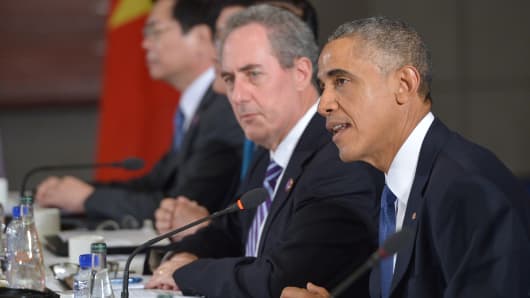You read that correctly: The benefits gained by signing a TPP without a currency provision would be rendered null by such a provision's absence. And don't be fooled by those who would dismiss these concerns out of hand, because language on currency would be right at home in a modern trade agreement. It's ridiculous, in fact, that this language isn't in there already.
Coming to terms with that starts with acknowledging how far we've come in 70 years of trade deals.
The scope of these agreements has expanded exponentially as our economy has evolved. We're well past Bretton Woods and the original General Agreement on Tariffs and Trade (GATT). The TPP, with its complex rules on intellectual property and rules of origin, is meant to be a blueprint for trade in the 21st century. It will lay out the rules of the road in deals yet to come. So say its advocates.
Read MoreUS lawmakers seek to tackle currency cheating with trade bill
I agree, so let's not waste the opportunity. Mr. Fratto was a part of the George W. Bush administration, and as such will surely recall that currency cheats only budge when they face consequences for their actions — like they did when a bill threatening tariffs for undervaluing currency passed the Senate in 2005 with a veto-proof margin. The Chinese government, which has leaned on currency as a mercantilist prop for decades, responded to the vote by letting its grossly undervalued yuan rise for a time.
But it doesn't have to be this way, and it shouldn't require gargantuan legislative lifts to address this issue at irregular intervals. No less of a free trader than Art Laffer thinks a currency rule should make it into the TPP, as do centrist economists like C Fred Bergsten and former IMF chief economist Simon Johnson. There is no doubt that currency manipulation helps inflate asset bubbles and imbalances, hurting consumers in China and Japan, manufacturers in America, and the quest for truly free and fair trade.
What's more, adding binding currency commitments to the TPP wouldn't turn around and bite us. Mr. Fratto, who knows better, echoes a fringe argument that the Federal Reserve's quantitative easing programs could be construed as currency manipulation; therefore a currency rule, introduced by the United States, would be hypocritical. But the rules on currency would be really no different than our current commitments as a member of both the World Trade Organization and International Monetary Fund, and I can't imagine Mr. Fratto arguing that we should withdraw from those agreements.
Read MoreAfter G-20, Lew says race to devalue a big mistake
Currency manipulation is identified by a combination of tests, including foreign asset reserves and current account surpluses. The U.S. has virtually no foreign currency holdings, and we are in no danger of running persistently high trade surpluses, now or at any time in future – both of which are necessary conditions before a "manipulator" charge could be successfully leveled. Those conditions don't exist, and they never will. Whether they'd like to admit it or not, the critics like Mr. Fratto know that such a scenario is impossible.
We've experienced pervasive currency manipulation over the last few decades. It has cost the United States trillions of dollars' worth of business, and millions of jobs. And the lack of an enforceable deterrent gives a green light for foreign governments to continue the bald-faced mercantilist practice.
The true free-market position in this argument is to finally put a stop to the most pervasive form of protectionism known today.
Read MoreDollar's rise won't puncture the US


